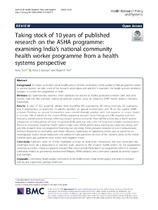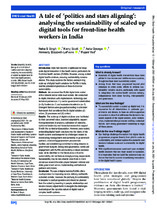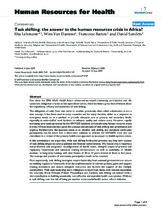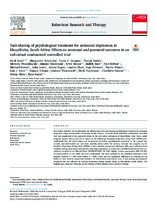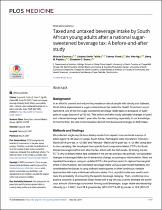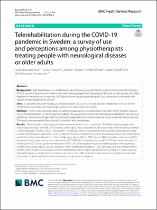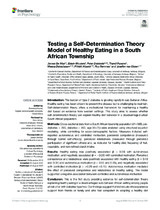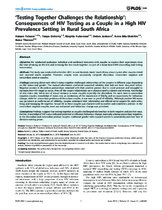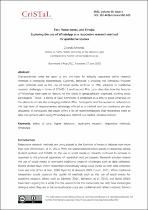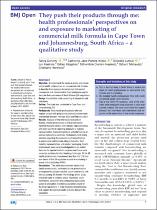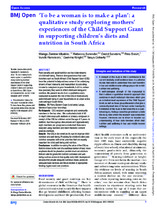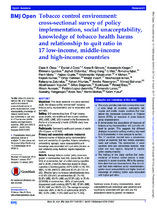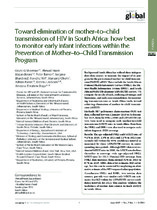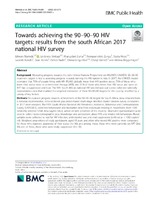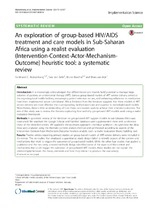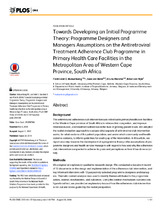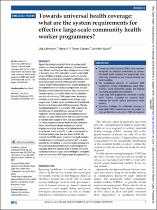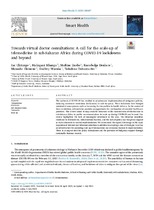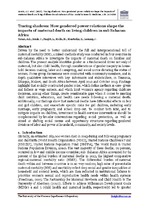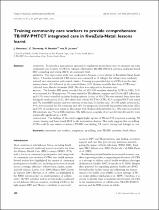Browsing School of Public Health by Title
Now showing items 705-724 of 804
-
Taking stock of 10 years of published research on the ASHA programme: Examining India’s national community health worker programme from a health systems perspective
(Health Research Policy and Systems, 2019)Background: As India’s accredited social health activist (ASHA) community health worker (CHW) programme enters its second decade, we take stock of the research undertaken and whether it examines the health systems interfaces ... -
A tale of ‘politics and stars aligning’: Analysing the sustainability of scaled up digital tools for front-line health workers in India
(BMJ Publishing Group, 2021)India has become a lighthouse for largescale digital innovation in the health sector, particularly for front-line health workers (FLHWs). However, among scaled digital health solutions, ensuring sustainability remains elusive. ... -
Task shifting: The answer to the human resources crisis in Africa?
(BioMed Central, 2009)Ever since the 2006 World Health Report advocated increased community participation and the systematic delegation of tasks to less-specialized cadres, there has been a great deal of debate about the expediency, efficacy ... -
Task-sharing of psychological treatment for antenatal depression in Khayelitsha, South Africa: Effects on antenatal and postnatal outcomes in an individual randomised controlled trial
(Elsevier, 2020)The study's objective was to determine the effectiveness of a task-sharing psychological treatment for perinatal depression using non-specialist community health workers. A double-blind individual randomised controlled ... -
Taxed and untaxed beverage intake by South African young adults after a national sugar-sweetened beverage tax: A before-and-after study
(Public Library of Science, 2021)Background In an effort to prevent and reduce the prevalence rate of people with obesity and diabetes, South Africa implemented a sugar-content-based tax called the Health Promotion Levy in April 2018, one of the first ... -
Telerehabilitation during the COVID-19 pandemic in Sweden: a survey of use and perceptions among physiotherapists treating people with neurological diseases or older adults
(2022)Background : Telerehabilitation, i.e. rehabilitation at a distance using Information and Communication Technology (ICT), is a promising avenue for improving health among people with neurological diseases or older adults ... -
Testing a self-determination theory model of healthy eating in a South African township
(Frontiers Media S.A., 2020)Type 2 diabetes (T2D) is one of the leading causes of death and disability, and its prevalence has been growing rapidly in sub-Saharan Africa (International Diabetes Federation, 2017). In response to this T2D pandemic, ... -
Testing together challenges the relationship': Consequences of HIV Testing as a couple in a High HIV prevalence setting in Rural South Africa
(Public Library of Science, 2013)OBJECTIVE: We conducted qualitative individual and combined interviews with couples to explore their experiences since the time of taking an HIV test and receiving the test result together, as part of a home-based HIV ... -
Text, voice-notes, and Emojis: Exploring the use of WhatsApp as a responsive research method for qualitative studies
(University of the Western Cape, 2022)Unprecedented times are upon us and the need for ethically responsive online research methods is increasing exponentially. Currently, literature is showing that previously frowned upon methods such as ... -
They push their products through me: health professionals’ perspectives on and exposure to marketing of commercial milk formula in Cape Town and Johannesburg, South Africa – a qualitative study
(BMJ Publishing Group, 2022)Objective To understand the views of public and private sector health professionals on commercial milk formula, to describe their exposure to companies that market commercial milk formula within their workplaces and ... -
‘To be a woman is to make a plan’: a qualitative study exploring mothers’ experiences of the Child Support Grant in supporting children’s diets and nutrition in South Africa
(BMJ Publishing Group, 2018)Food security and good nutrition are key determinants of child well-being. There is strong evidence that cash transfers such as South Africa’s Child Support Grant (CSG) have the potential to help address some of the ... -
Tobacco control environment: cross-sectional survey of policy implementation, social unacceptability, knowledge of tobacco health harms and relationship to quit ratio in 17 low-income, middle-income and high-income countries
(BMJ Publishing Group, 2017)OBJECTIVES: This study examines in a cross-sectional study ‘the tobacco control environment’ including tobacco policy implementation and its association with quit ratio. SETTING: 545 communities from 17 high-income, ... -
Toward elimination of mother–to–child transmission of HIV in South Africa: how best to monitor early infant infections within the Prevention of Mother–to–Child Transmission Program
(Edinburgh University Global Health Society, 2017)BACKGROUNDSouth Africa has utilized three independent data sources to measure the impact of its program for the prevention of mother–to–child transmission (PMTCT) of HIV. These include the South African National Health ... -
Towards achieving the 90–90–90 HIV targets: Results from the south African 2017 national HIV survey
(Springer Nature, 2020)Background: Measuring progress towards the Joint United Nations Programme on HIV/AIDS (UNAIDS) 90–90–90 treatment targets is key to assessing progress towards turning the HIV epidemic tide. In 2017, the UNAIDS model estimated ... -
Towards developing an initial programme theory: Programme designers and managers assumptions on the antiretroviral treatment adherence club programme in primary health care facilities in the metropolitan area of Western Cape province, South Africa
(PLOS one, 2016)Background The antiretroviral adherence club intervention was rolled out in primary health care facilities in the Western Cape province of South Africa to relieve clinic congestion, and improve retention in care, and ... -
Towards developing an initial programme theory: Programme designers and managers assumptions on the antiretroviral treatment adherence club programme in primary health care facilities in the metropolitan area of Western Cape Province, South Africa
(Public Library of Science, 2016)BACKGROUND The antiretroviral adherence club intervention was rolled out in primary health care facilities in the Western Cape province of South Africa to relieve clinic congestion, and improve retention in care, and ... -
Towards universal health coverage: What are the system requirements for effective large-scale community health worker programmes?
(BMJ Publishing Group, 2019)Against the background of efforts to strengthen health systems for universal health coverage and health equity, many African countries have been relying on lay members of the community, often referred to as community ... -
Towards virtual doctor consultations: A call for the scale-up of telemedicine in sub-Saharan Africa during COVID-19 lockdowns and beyond
(Elsevier, 2021-07)The outbreak of COVID-19 has resulted in adoption and implementation of mitigatory policies, including movement restrictions (lockdowns) to curb its spread. These lockdowns have brought unintended consequences such as ... -
Tracing shadows: How gendered power relations shape the impacts of maternal death on living children in Sub-Saharan Africa
(Elsevier, 2015)Driven by the need to better understand the full and intergenerational toll of maternal mortality (MM), a mixed-methods study was conducted in four countries in sub-Saharan Africa to investigate the impacts of maternal ... -
Training community care workers to provide comprehensive TB⁄HIV⁄PMTCT integrated care in KwaZulu-Natal: Lessons learnt
(Wiley, 2012)To describe a participatory approach to implement and evaluate ways to integrate and traincommunity care workers (CCWs) to enhance collaborative TB⁄HIV⁄PMTCT activities, and home-basedHIV counseling and testing (HCT) at ...

